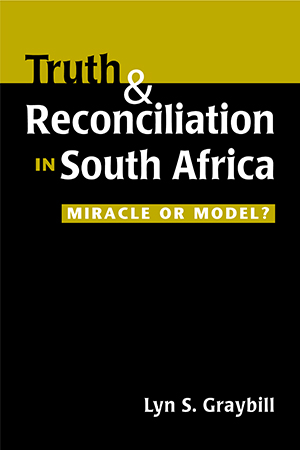Lyn S. Graybill
Was South Africa's Truth and Reconciliation Commission (TRC) a "miracle" that depended on the unique leadership of Nelson Mandela and Desmond Tutu? Or does it provide a working model for other traumatized nations? Addressing these questions, Lyn Graybill explores the political origins, theological underpinnings, and major achievements of the world's most ambitious truth commission—an institution that offered indemnity to perpetrators of gross human rights abuses, and a process that urged victims to forgive.
Graybill distills in one concise and very readable volume a vast amount of information on the TRC, including discussions of a number of groups—the media, religious communities, and the medical and business sectors—that came under the scrutiny of the commission. She also addresses the theory and practice of forgiveness and the relative advantages of amnesty vs. prosecution. She concludes with an indictment of the ANC government's failure to enact the commission's recommendations for substantial reparations to victims and with an overview of NGO efforts to continue the reconciliation process.
Lyn S. Graybill teaches at the Sam Nunn School of International Affairs at the Georgia Institute of Technology. She is author of Religion and Resistance Politics in South Africa and coeditor of Africa's Second Wave of Freedom: Development, Democracy and Rights.
"The reader will learn much about South Africas postapartheid struggle to build an inclusive, democratic, political community."—James S. Wunsch, Africa Today
"Graybill does a fantastic job of synthesizing a great deal of information and perspectives on theories of reconciliation and the TRC. Her delivery and tone make this book an informative but in no way bewildering read."—David Rothstein, Ethics and International Affairs
"Insightful and thought-provoking.... Graybill's book is finely crafted and bedded in thorough research. It is also, arguably, the most comprehensive account of the TRC to emerge from a burgeoning literature on the subject. As such, it is an excellent introductory text."—H-NET Book Review
"[A] compelling addition to recent literature on the Truth and Reconciliation Commission.... This work belongs in academic, special, and large public libraries."—Library Journal
"Lyn Graybill deals with a complex subject in a clear, concise, and compelling manner. Her book is essential to our understanding of contemporary South Africa."—John Stremlau, Jan Smuts Professor of International Relations, University of Witwatersrand
"Graybill takes us deep into South Africa's Truth and Reconciliation Commission—the origins, the tears, the defiance, the controversies. She does not shy away from asking important, penetrating questions.... This is a most important book on postconflict reconciliation and, in particular, the choices that nations must make in balancing peace and justice."—Princeton Lyman
"Lyn Graybill offers remarkable insights into how one nation has dealt with an emotionally charged issue ... that can be helpful to other deeply divided countries."—Paul Simon








